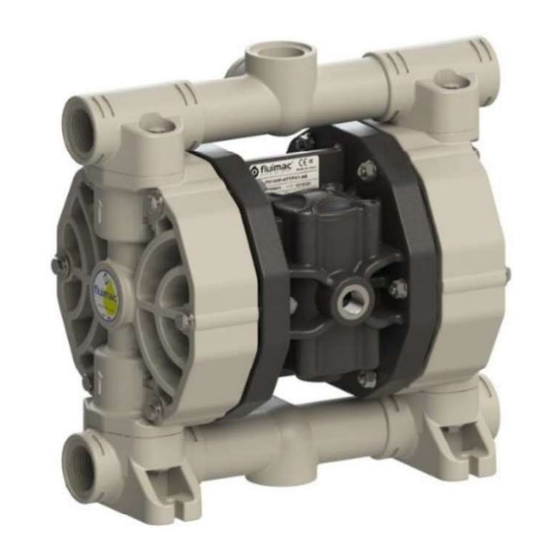
Advertisement
Table of Contents
- 1 About this Manual
- 2 Pump Identification
- 3 Declaration of Conformity
- 4 Identification Code
- 5 Pump Description
- 6 Technical Features
- 7 Warranty
- 8 Safety Rules
- 9 Installation and Use Instructions
- 10 Transport and Positioning
- 11 Installation
- 12 Product Circuit Maintenance
- 13 Troubleshooting
- 14 Demolition and Disposal
- Download this manual
Advertisement
Table of Contents

Summarization of Contents
INTRODUCTION
ABOUT THIS MANUAL
This manual is an integral part of the pump and represents a safety device.
PUMP IDENTIFICATION
Provides information on the pump's identification label, serial number, model, and year.
DECLARATION OF CONFORMITY
EU DECLARATION OF CONFORMITY
Details the pump's compliance with EU directives and harmonized standards.
MARKINGS AND GENERAL INFORMATION
ATEX MARKING
Explains the ATEX marking requirements for explosive atmospheres, including zones and categories.
IECEX MARKING
IDENTIFICATION CODE
Details the coding system used to identify pump models, sizes, and components.
TECHNICAL FEATURES
TEMPERATURE CLASSES FOR PUMPS TO BE INSTALLED IN AN EXPLOSIVE ENVIRONMENT (ZONE 1)
Defines temperature classes and data for pumps used in explosive atmospheres.
OPERATING PRINCIPLE
ATEX ZONE I
Specifies temperature limits and conditions for ATEX Zone I installations.
SAFETY RULES
GENERAL SAFETY WARNINGS
Essential instructions for pump compliance, personnel training, and safe operation.
ATEX SAFETY RESPONSIBILITIES
Defines user responsibility for area classification in ATEX environments.
SAFETY RULES
FLUID AND GROUNDING WARNINGS
Crucial warnings about fluid handling, grounding, and material compatibility.
SAFETY RULES
OPERATIONAL AND PROTECTION WARNINGS
Warnings regarding diaphragm failure, cleaning, improper use, and protection.
INSTALLATION AND USE INSTRUCTIONS
TRANSPORT AND POSITIONING
Instructions for receiving, unpacking, and positioning the pump.
INSTALLATION AND USE INSTRUCTIONS
STORAGE GUIDELINES
Guidelines for storing pumps in original boxes before installation.
HYDRAULIC SYSTEM INSTALLATION
Steps for connecting the pump to the product circuit and hydraulic system.
INSTALLATION AND USE INSTRUCTIONS
PLANT SOLUTION RECOMMENDATIONS
Recommendations for hydraulic circuit connections and plant solutions.
INSTALLATION AND USE INSTRUCTIONS
PIPING AND INSTALLATION WARNINGS
Important warnings about piping support and fluid handling during installation.
INSTALLATION AND USE INSTRUCTIONS
MATERIAL AND GROUNDING WARNINGS
Warnings concerning conductive materials, grounding, and operating pressure.
USE
OPERATIONAL WARNINGS
Key warnings for pump usage, including fluid compatibility and operation.
USE
START-UP PROCEDURE
Detailed procedure for starting up the pump correctly.
USE
SHUTDOWN AND MAINTENANCE WARNINGS
Warnings on stopping the pump, danger signs, and product circuit maintenance.
PRODUCT CIRCUIT MAINTENANCE
MAINTENANCE RECOMMENDATIONS
Recommendations for qualified personnel performing maintenance and inspections.
PRODUCT CIRCUIT MAINTENANCE
BALLS AND BALLS SEATS MAINTENANCE
Procedure for cleaning and replacing balls and ball seats.
DIAPHRAGMS MAINTENANCE
Instructions for checking and replacing diaphragms for safety and performance.
PRODUCT CIRCUIT MAINTENANCE
DIAPHRAGMS MAINTENANCE
Detailed steps for replacing product diaphragms and their associated components.
PNEUMATIC EXCHANGER MAINTENANCE
MODELS P3-P7 EXCHANGER MAINTENANCE
Procedure for maintaining the pneumatic exchanger for specific pump models.
PNEUMATIC EXCHANGER MAINTENANCE
MODELS P18-P30 EXCHANGER MAINTENANCE
Maintenance steps for the pneumatic exchanger on P18-P30 pump models.
MODELS P50-P55 EXCHANGER MAINTENANCE
Maintenance steps for the pneumatic exchanger on P50-P55 pump models.
TROUBLESHOOTING
PUMP DOES NOT START
Diagnosing and resolving issues when the pump fails to start.
TROUBLESHOOTING
MODELS P60-P700 EXCHANGER MAINTENANCE
Maintenance procedures for the pneumatic exchanger on various pump models.
PUMP RUNS BUT DOES NOT PUMP
Troubleshooting steps for when the pump operates but fails to move fluid.
PUMP WORKS WITH SLOW CYCLES
Identifying and fixing causes for slow pump operation cycles.
TROUBLESHOOTING
PUMP WORKS IRREGULARLY
Diagnosing and resolving irregular pump operation.
PUMP STALLS
Troubleshooting steps for pump stalling issues.
PUMP DOES NOT DISTRIBUTE/DELIVER PROPERLY
Troubleshooting for when the pump fails to distribute or deliver fluid correctly.
DECOMMISSIONING
DECOMMISSIONING WARNINGS
Important warnings regarding fluid discharge and storage conditions.
DEMOLITION AND DISPOSAL
DISPOSAL WARNINGS
Warnings concerning the discharge of residual fluids and proper disposal methods.





Need help?
Do you have a question about the P55 and is the answer not in the manual?
Questions and answers